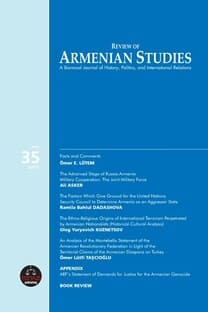(KAFKASYA SAVAŞININ SON AŞAMASINDA KUZEY BATI KAFKASYA’DA RUSYA VE OSMANLI İMPARATORLUĞU’NUN İZLEDİĞİ POLİTİKALAR)
Kuzeybatı Kafkasya, Rusya, Osmanlı İmparatorluğu, Karadeniz, Çerkesya
NORTH-WESTERN CAUCASUS IN THE POLICIES PURSUED BY RUSSIA AND THE OTTOMAN EMPIRE AT THE FINAL STAGE OF THE CAUCASIAN WAR
North-Western Caucasus, Russia, Ottoman Empire, the Black Sea, Circassia,
- ISSN: 1303-5304
- Yayın Aralığı: 2
- Başlangıç: 2002
- Yayıncı: Terazi Yayıncılık Basım Dağıtım Danışmanlık Eğitim Organizasyon Matbaacılık Kırtasiye Tic. Ltd. Şti.
TÜRKİYE VE İRAN’IN GÜNEY KAFKASYA’DAKİ JEOPOLİTİK, TİCARİ VE EKONOMİK ÇIKARLARI
OSMANLI İMPARATORLUĞU’NUN BİR PARÇASI OLARAK KAFKASYA VE TRANSKAFKASYA
“1915’LE İLGİLİ TÜRK-ERMENİ ANLAŞMAZLIĞINI ANLAMAK”
(TARİHE KISA BİR BAKIŞ: KARS ANTLAŞMASI NASIL İMZALANDI (MART-EKİM 1921)?)
TÜRKİYE’NİN GÜNEY KAFKASYA’DAKİ POLİTİAKLARI VE BÖLGESEL GÜVENLİK MEKANİZMALARI
(ERMENİLERİN KURDUKLARI CEMİYETLER VE KOMİTELERİN MARAŞ VE ÇEVRESİNDEKİ FAALİYETLERİ)
(OSMANLI İMPARATORLUĞU’NUN BİR PARÇASI OLARAK KAFKASYA VE TRANSKAFKASYA)
